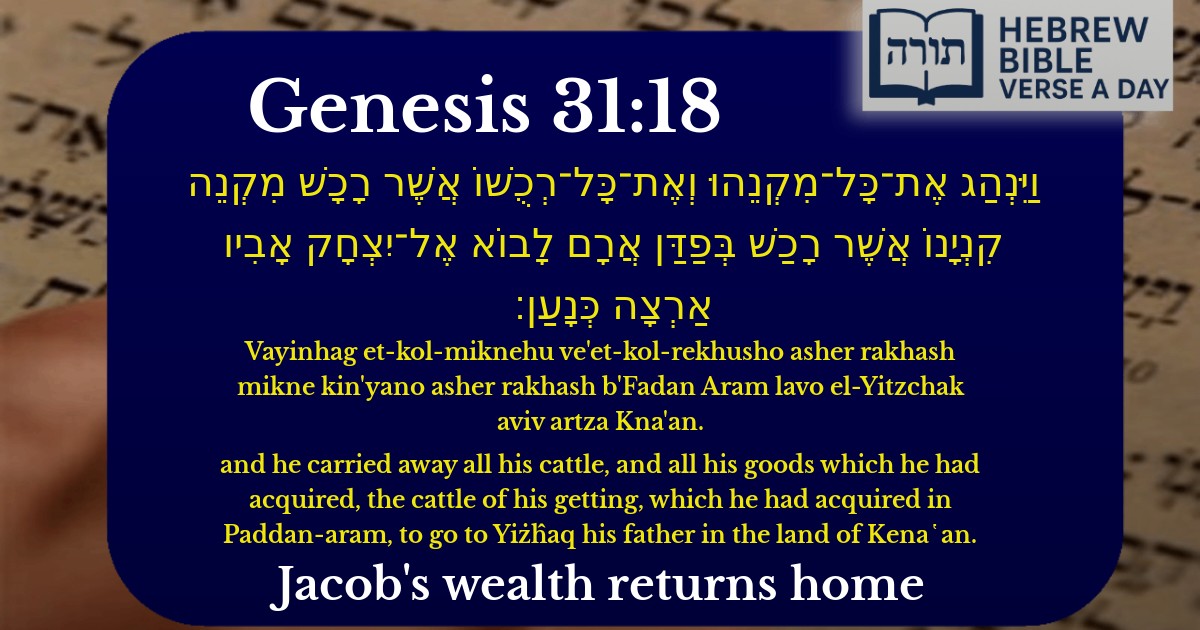Join Our Newsletter To Be Informed When New Videos Are Posted
Join the thousands of fellow Studends who rely on our videos to learn how to read the bible in Hebrew for free!
Hebrew Text
וַיִּנְהַג אֶת־כָּל־מִקְנֵהוּ וְאֶת־כָּל־רְכֻשׁוֹ אֲשֶׁר רָכָשׁ מִקְנֵה קִנְיָנוֹ אֲשֶׁר רָכַשׁ בְּפַדַּן אֲרָם לָבוֹא אֶל־יִצְחָק אָבִיו אַרְצָה כְּנָעַן׃
English Translation
and he carried away all his cattle, and all his goods which he had acquired, the cattle of his getting, which he had acquired in Paddan-aram, to go to Yiżĥaq his father in the land of Kena῾an.
Transliteration
Vayinhag et-kol-miknehu ve'et-kol-rekhusho asher rakhash mikne kin'yano asher rakhash b'Fadan Aram lavo el-Yitzchak aviv artza Kna'an.
Hebrew Leining Text
וַיִּנְהַ֣ג אֶת־כׇּל־מִקְנֵ֗הוּ וְאֶת־כׇּל־רְכֻשׁוֹ֙ אֲשֶׁ֣ר רָכָ֔שׁ מִקְנֵה֙ קִנְיָנ֔וֹ אֲשֶׁ֥ר רָכַ֖שׁ בְּפַדַּ֣ן אֲרָ֑ם לָב֛וֹא אֶל־יִצְחָ֥ק אָבִ֖יו אַ֥רְצָה כְּנָֽעַן׃
וַיִּנְהַ֣ג אֶת־כׇּל־מִקְנֵ֗הוּ וְאֶת־כׇּל־רְכֻשׁוֹ֙ אֲשֶׁ֣ר רָכָ֔שׁ מִקְנֵה֙ קִנְיָנ֔וֹ אֲשֶׁ֥ר רָכַ֖שׁ בְּפַדַּ֣ן אֲרָ֑ם לָב֛וֹא אֶל־יִצְחָ֥ק אָבִ֖יו אַ֥רְצָה כְּנָֽעַן׃
🎵 Listen to leining
Parasha Commentary
📚 Talmud Citations
This verse is not quoted in the Talmud.


Verse Context
The verse (Bereshit 31:18) describes Yaakov's departure from Lavan's household, taking with him all his possessions as he returns to his father Yitzchak in Eretz Canaan. This marks the culmination of Yaakov's 20-year stay in Padan Aram, fulfilling his initial journey to find a wife and escape Esav's wrath.
Rashi's Commentary
Rashi explains that the phrase "מִקְנֵה קִנְיָנוֹ" (the cattle of his getting) refers specifically to the livestock Yaakov acquired through his clever breeding strategies (Bereshit 30:37-43). The double language emphasizes that these were rightfully his, not taken unlawfully from Lavan. Rashi also notes that the Torah mentions "Paddan Aram" to contrast Yaakov's pure intentions with Lavan's deceit - while Lavan sought to exploit Yaakov, Yaakov only took what he earned honestly.
Ibn Ezra's Insight
Ibn Ezra observes that the verse stresses Yaakov's complete departure - he took all his possessions without leaving anything behind in Padan Aram. This demonstrates his final break from Lavan's influence and his full commitment to returning to his ancestral homeland.
Midrashic Interpretation (Bereshit Rabbah)
Ramban's Perspective
Ramban explains that the detailed accounting of Yaakov's possessions teaches that material wealth is only meaningful when acquired honestly and used for divine purposes. Yaakov's careful tracking of his property demonstrated his integrity, contrasting with Lavan's constant attempts to cheat him.
Halachic Implication (Choshen Mishpat)
Later halachic authorities derive from this verse that one must be scrupulous in business dealings, as Yaakov was careful to only take what rightfully belonged to him. The emphasis on his honest acquisition establishes an ethical standard for Jewish commercial conduct.